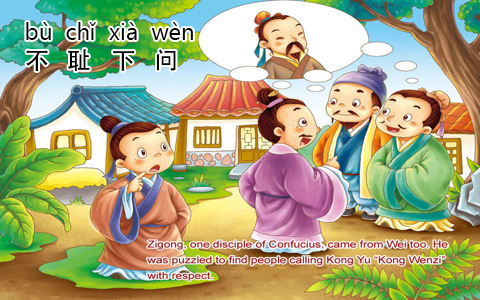
Listen to the whole story:
Chūnqiū shí, wèiguó yǒu gè jiào Kǒng Yǔ de dàfu.
春秋 时,卫 国 有 个 叫 孔 圉 的 大夫。
In the Spring and Autumn period, there was a senior official named Kong Yu in the State of Wei.
Tā cōngming hàoxué, érqiě wéirén shífēn qiānxū chéngkěn.
他 聪明 好学, 而且 为人 十分 谦虚 诚恳。
He was smart and intelligent, and was very modest in behavior.
Kǒng Yǔ sǐ hòu, wèiguó guójūn cì le tā yígè shìhào, jiào “wén.”
孔 圉 死 后, 卫国 国君 赐了他 一个 谥号, 叫 “文”。
After his death, the king of the State of Wei granted him a posthumous title “wen.”
Hòurén men dōu zūnchēng tā wéi Kǒngwénzǐ.
后人 们 都 尊称 他 为 孔文子。
Later, people addressed him using the title “Kong Wenzi,” a show of great respect.
Dāngshí Kǒngzǐ yǒu yígè míng jiào Zǐgòng de xuésheng,
当时 孔子 有 一个 名 叫 子贡 的 学生,
Confucius had a student named Zigong at that time,
Tā bù zhīdào Kǒng Yǔ zhège shìhào de yóulái,
他 不 知道 孔 圉 这个 谥号 的 由来,
He did not know the origin of this posthumous title,
biàn qù wèn lǎoshī Kǒngzǐ , “Kǒng Yǔ de shìhào wèishénme jiào ‘wén’ ne? ”
便 去 问 老师 孔子: “孔 圉 的 谥号 为什么 叫 ‘文’ 呢?”
and he asked his teacher: “Why is the posthumous title of Kong Yu ‘wen’?”
Kǒngzǐ xiào le xiào huídá shuō, “Kǒng Yǔ búdàn shì gè cōngming hàoxué de rén,
孔子 笑 了 笑 回答 说: “孔 圉 不但 是 个 聪明 好学 的 人,
Confucius smiled and answered: “Kong Yu is not only very intelligent,
érqiě tā bú rènwéi xiàng dìwèi bǐ zìjǐ dī, xuéwen bùrú zìjǐ de rén
而且 他 不 认为 向 地位 比自己低、学问 不如自己的 人
qǐngjiào shì yìzhǒng xiūchǐ de shìqing, suǒyǐ cìgěi tā de shìhào jiào ‘wén’.”
请教 是 一种 羞耻 的 事情, 所以 赐给 他 的 谥号 叫 ‘文’。”
but he is also very modest and does not feel ashamed to learn from his inferiors, so his posthumous title is “wen.”
Kong Yu himself was very erudite, but he still learned from those people who were below himself in rank and educational attainment.
Nowadays, people cite this idiom to describe someone who is modest and does not feel ashamed to learn from those of a lower status. All of us commoners should learn from Kong Yu’s example during the course of our education.
1. Which word means “to answer?”
A. 回答 (huídá)
B. 提问 (tíwèn)
C. 答案 (dá’àn)
2. Which word means “smile?”
A. 笑 (xiào)
B. 美 (měi)
C. 好 (hǎo)
Chinese Idiom
General Chinese (Beginner Level)
General Chinese (Intermediate Level)



